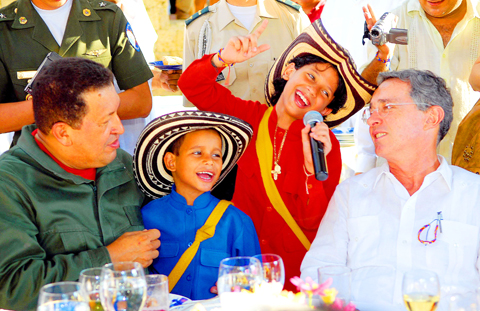The presidents of Colombia and Venezuela pledged on Saturday to invest US$100 million each in a special fund in hopes of boosting cross-border trade as the world economic crisis slashes global demand for their exports.
The cash will help create small businesses and should finance infrastructure projects along the border, Venezuelan President Hugo Chavez said after four hours of talks in the Caribbean port of Cartagena with his Colombian counterpart, Alvaro Uribe.
“Nobody knows where this crisis might go,” Chavez told a televised news conference.

PHOTO: AFP
neighbors
Trade between the two nations reached a record US$7.2 billion last year, and Chavez said they should aim for US$10 billion a year this year and next. Both neighbors are looking to prevent the global slowdown from crimping commerce and spurring unemployment.
Once-rapid growth in Venezuela’s oil-dependent economy is slowing with falling crude prices, while Colombia has seen textile sales decline. Caracas is Colombia’s biggest trade partner after the US, making it especially vulnerable to a slowdown in Venezuela.
Chavez and Uribe also discussed ways to boost primary manufacturing so car components can be made locally from the region’s natural resources, reducing reliance on imports, Chavez said.
Venezuela agreed to consider easing quotas on Colombian automobile imports, including trucks, buses and vehicles that burn natural gas, Chavez said.
REBELS
As he arrived for the meeting, Chavez was asked about his alleged support for leftist rebels who have been trying to overthrow Colombia’s government.
Electronic documents found on a slain rebel’s computer last year suggest he offered the Revolutionary Armed Forces of Colombia, or FARC, an open-ended loan of several hundred million dollars.
“If I were backing any kind of subversive, terrorist or violent movement in Colombia I wouldn’t be here,” Chavez said. “What would I do here?”

GROWING OWINGS: While Luxembourg and China swapped the top three spots, the US continued to be the largest exposure for Taiwan for the 41st consecutive quarter The US remained the largest debtor nation to Taiwan’s banking sector for the 41st consecutive quarter at the end of September, after local banks’ exposure to the US market rose more than 2 percent from three months earlier, the central bank said. Exposure to the US increased to US$198.896 billion, up US$4.026 billion, or 2.07 percent, from US$194.87 billion in the previous quarter, data released by the central bank showed on Friday. Of the increase, about US$1.4 billion came from banks’ investments in securitized products and interbank loans in the US, while another US$2.6 billion stemmed from trust assets, including mutual funds,

Micron Memory Taiwan Co (台灣美光), a subsidiary of US memorychip maker Micron Technology Inc, has been granted a NT$4.7 billion (US$149.5 million) subsidy under the Ministry of Economic Affairs A+ Corporate Innovation and R&D Enhancement program, the ministry said yesterday. The US memorychip maker’s program aims to back the development of high-performance and high-bandwidth memory chips with a total budget of NT$11.75 billion, the ministry said. Aside from the government funding, Micron is to inject the remaining investment of NT$7.06 billion as the company applied to participate the government’s Global Innovation Partnership Program to deepen technology cooperation, a ministry official told the

Taiwan Semiconductor Manufacturing Co (TSMC, 台積電), the world’s leading advanced chipmaker, officially began volume production of its 2-nanometer chips in the fourth quarter of this year, according to a recent update on the company’s Web site. The low-key announcement confirms that TSMC, the go-to chipmaker for artificial intelligence (AI) hardware providers Nvidia Corp and iPhone maker Apple Inc, met its original roadmap for the next-generation technology. Production is currently centered at Fab 22 in Kaohsiung, utilizing the company’s first-generation nanosheet transistor technology. The new architecture achieves “full-node strides in performance and power consumption,” TSMC said. The company described the 2nm process as

JOINT EFFORTS: MediaTek would partner with Denso to develop custom chips to support the car-part specialist company’s driver-assist systems in an expanding market MediaTek Inc (聯發科), the world’s largest mobile phone chip designer, yesterday said it is working closely with Japan’s Denso Corp to build a custom automotive system-on-chip (SoC) solution tailored for advanced driver-assistance systems and cockpit systems, adding another customer to its new application-specific IC (ASIC) business. This effort merges Denso’s automotive-grade safety expertise and deep vehicle integration with MediaTek’s technologies cultivated through the development of Media- Tek’s Dimensity AX, leveraging efficient, high-performance SoCs and artificial intelligence (AI) capabilities to offer a scalable, production-ready platform for next-generation driver assistance, the company said in a statement yesterday. “Through this collaboration, we are bringing two